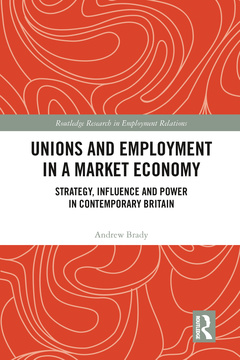Description
Unions and Employment in a Market Economy
Strategy, Influence and Power in Contemporary Britain
Routledge Research in Employment Relations Series
Author: Brady Andrew
Language: English
Subjects for Unions and Employment in a Market Economy:
Keywords
Propose EU Legislation; IG Metall; Labour Party Annual Conference; TUC General Secretary; Labour Leaders; Employment Relations Framework; Fire Brigades Union; TUC General; National Graphical Association; Jon Cruddas; TUC General Council; TUC Labour Party Liaison Committee; Labour Party NEC; Liaison Committee; Rodney Bickerstaffe; TUC Leadership; Employment Relations Reforms; Trade Union; Tug; Era Outcome; TUC Congress; National Minimum Wage; Trade Union Coordination; Trade Union Recognition; Affiliate TUC Union
Publication date: 03-2021
· 15.2x22.9 cm · Paperback
Publication date: 03-2019
· 15.2x22.9 cm · Hardback
Description
/li>Contents
/li>Readership
/li>Biography
/li>
Due to the sharp declines in trade union density and collective bargaining coverage post-1979, the shift by trade unions towards political action has had significant implications for employment relations regulation in contemporary Britain. Yet, there remains insufficient discussion of the factors of influence affecting changes in the political action process from a historical and contemporary perspective. Unions and Employment in a Market Economy will evidence how trade unions were able to offset environmental constraints through a progressive focus on political action, despite diminished power in the Labour Party?s structures and the wider economy. The book presents four legislative events categorised as functional equivalents enacted in two different periods of Labour governance (1974-79 and 1997-2010). The selected events are the Social Contract (1974-79), National Minimum Wage (1998), Employment Relations Act (1999) and the Warwick Agreement (2004). The book?s findings lend credence to the proposition that in a liberal market economy there is a valuable dividend associated with trade union political exchange through the Labour Party.
List of Tables
List of Boxes
Preface
Chapter 1: Trade Union Strategy, Influence and Power in Contemporary Britain: An Introduction
Introduction
Varieties of Capitalism
Deconstruction and Reconstruction
New Labour: Continuation of neoliberalism or breaking with the past?
Labour Party: A Channel for Trade Union Political Action
Trade Union Leadership, Strategy and Structure
Conclusion
Chapter 2: The Social Contract (1974-79)
Introduction
Donovan Commission and In Place of Strife
The Industrial Relations Act (1971)
The Social Contract in Formation
The Social Contract in Operation
The Winter of Discontent 1978/9
Evaluation and Reflections
Chapter 3: Employment Relations Reform under New Labour: Context, Continuity and Change
Introduction
Conservative Liberal Market Reform
Political Action: New Mechanisms
Ideological Disunity, Space and Convergence: Opposition Years
Progressive Centralisation
Formal to Informal Processes
1993/7 Political Fund Ballots
New Policy-Making Processes
Agency and Diminishing Trust
Chapter 4: The National Minimum Wage (1998)
Introduction
The Development of the NMW
The Low Pay Commission
Policy contestation and division
Evaluation and Reflections
Chapter 5: The Employment Relations Act (1999)
Introduction
Fairness at Work (May 1998)
Employment Relations Bill
ERA (1999)
Evaluation and Reflections
Chapter 6: The Warwick Agreement (2004)
Introduction
Exeter Policy Forum (2000)
Leadership Dynamics
The Big Four
Institutional Reconfiguration: TULO
The Agreement Implementation
Evaluation and Reflections
Chapter 7: Strategy, Influence and Power: lessons from history
Introduction
Structural Context: shifting fronts
Degree of Coordination
Transition to Informality
Concluding Observations
Chapter 8: Conclusion
Leadership and Strategic Choice
Political Action and Electoral Reform
New Structural Pressures
Appendix A: List of Interviews as Introduced
Appendix B: Key provisions of the Employment Act 2002
Appendix C: Key Warwick Agreement pledges
Glossary
Index
Andrew Brady is an academic with a PhD from the University of Strathclyde and works in the British labour movement.




